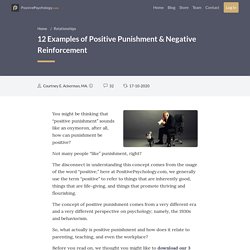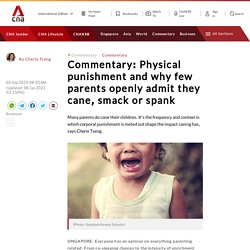

Positive Reinforcement. Negative Reinforcement. A summary of Positive & Negative Reinforcement. Continual Reinforcement. Partial Reinforcement. A summary of Continuous Reinforcement & Partial Reinforcement. Positive Punishment. Negative Punishment. A summary of Positive & Negative Punishment. Learning: Negative Reinforcement vs. Punishment. Reinforcement vs Punishment. 12 Examples of Positive Punishment & Negative Reinforcement. You might be thinking that “positive punishment” sounds like an oxymoron, after all, how can punishment be positive?

Not many people “like” punishment, right? The disconnect in understanding this concept comes from the usage of the word “positive;” here at PositivePsychology.com, we generally use the term “positive” to refer to things that are inherently good, things that are life-giving, and things that promote thriving and flourishing. The concept of positive punishment comes from a very different era and a very different perspective on psychology; namely, the 1930s and behaviorism. So, what actually is positive punishment and how does it relate to parenting, teaching, and even the workplace?
Before you read on, we thought you might like to download our 3 Positive Psychology Exercises for free. Let’s move away from caning and corporal punishment for our kids. SINGAPORE: Recently, news about a three year-old boy who was excessively caned by his father again cast a spotlight on disciplinary practices in Singapore.

The father was subsequently charged of ill-treating a child by causing him unnecessary physical pain. Parents who use corporal punishment rarely set out with the intention to injure their children. However, a handful inadvertently cross the line when they are unable to control their emotions and actions. Last year, the Ministry of Social and Family Development investigated 660 cases of physical abuse in Singapore, which accounts for 60 per cent of all child abuse investigations.
Physical punishment and why few parents openly admit they cane, smack or spank. SINGAPORE: Everyone has an opinion on everything parenting related: From co-sleeping choices to the intensity of enrichment lessons.

But there are fewer things more divisive – and morbidly fascinating – as the discussion of parenting and discipline, specifically, the relevance and role of physical punishment in disciplining a child. To cane or not to cane, that is the question. The value of reinforcing positive behaviour for our teens. As children approach adolescence, they sometimes begin testing limits, bending the rules and otherwise going against the grain.

While this is normal behaviour for teens, it can be incredibly trying for you, as a parent. Teenagers may also be dealing with the stresses that come with trying to fit in with their peers and assert their growing independence. However, at the same time, they are looking for validation from the adults around them.